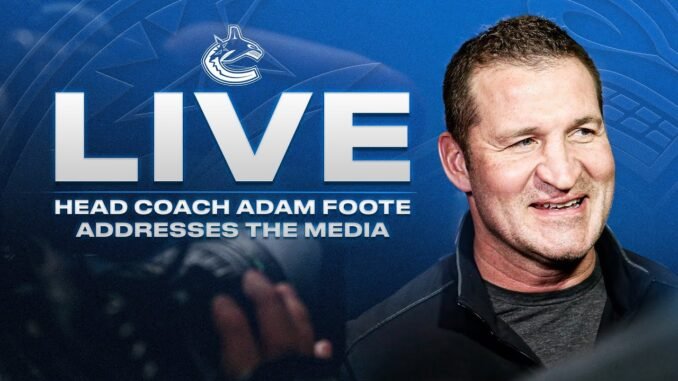
BREAKING NEWS: Adam Foote Parts Ways with Patrik Allvin’s Vision, Signs Veteran Defenseman Derek Forbort to a One-Year Deal—Here’s Why the Decision Was Made
In a bold and unexpected move that has sent waves through the NHL community, Adam Foote, known for his sharp hockey mind and evolving leadership role, has reportedly chosen to deviate from the plans of Vancouver Canucks General Manager Patrik Allvin by orchestrating the signing of experienced defenseman Derek Forbort to a one-year contract. The signing, which has now been officially confirmed, comes amid whispers of strategic disagreements within the organization, suggesting a growing divide between Allvin’s broader long-term approach and Foote’s more immediate tactical preferences.
Foote, who joined the Canucks’ coaching and player development staff with a reputation for discipline, toughness, and defensive acumen, has shown a particular interest in building a blue line that emphasizes physicality, reliability, and veteran savvy. His decision to back the acquisition of Forbort—a seasoned NHL blueliner with over 500 games of experience—signals a clear shift in direction that contrasts with the youth-focused rebuild that Allvin had been publicly advocating in recent months.
Sources within the organization have revealed that tension had been brewing behind the scenes, as Foote grew increasingly concerned about the lack of veteran depth on the back end. With several of Vancouver’s young defensemen still in the development phase and prone to inconsistency, Foote reportedly pushed for a stabilizing presence—someone who could offer leadership, block shots, kill penalties, and log tough minutes against top competition.
That player, in Foote’s mind, was Derek Forbort.
Forbort, 32, has built a reputation as a gritty, stay-at-home defenseman who embraces the less glamorous but critically important aspects of the game. During his most recent stint with the Boston Bruins, he was regularly relied upon in shutdown roles and on the penalty kill, particularly in high-pressure situations. Though he has dealt with injuries in recent seasons, his impact when healthy has been undeniable. His size, toughness, and experience make him an ideal candidate for teams in need of defensive balance.
Allvin, however, had reportedly been hesitant to make such a move. The Canucks’ general manager has long emphasized the importance of building through youth and draft capital, aiming to give more opportunities to younger blueliners like Jack Rathbone and Filip Hronek. By committing a roster spot and salary to a veteran like Forbort, Allvin feared it might hinder the development of younger players and potentially slow down the team’s broader organizational goals.

Despite these reservations, Foote persisted, and after internal discussions that reportedly grew increasingly tense, he was given the green light to bring Forbort on board—albeit with the understanding that the move would be judged based on results. The one-year nature of the contract appears to be a compromise between both sides: it provides the immediate help Foote believes is necessary, while not tying the club down long-term or deviating too far from Allvin’s vision of sustainability and development.
In announcing the signing, Foote spoke highly of Forbort’s skill set and character, saying, “Derek brings a level of professionalism and commitment that we need right now. He’s someone who leads by example, isn’t afraid to do the dirty work, and understands what it takes to win at the NHL level.” Those close to Foote have noted that his admiration for Forbort stems not only from on-ice qualities but also from a shared philosophy of team-first, defense-first hockey—principles Foote himself embodied during his storied playing career.
Reactions to the move have been mixed among analysts and fans. Some applaud the decision, calling it a smart, short-term fix for a Canucks team that has struggled defensively over the last couple of seasons. Others argue it reflects a lack of organizational unity and fear it may undermine the long-term development of younger players. Still, many agree that if Forbort can stay healthy and deliver consistent, hard-nosed minutes, his impact could be felt well beyond the stat sheet.
In light of this signing, questions remain about the dynamic between Foote and Allvin moving forward. While it’s not uncommon for differing viewpoints to exist within an NHL front office, the key will be whether the two leaders can align their visions as the season progresses. Success on the ice often has a way of healing internal rifts, and if Forbort proves to be the missing piece the Canucks need to solidify their defensive structure, Foote’s instincts may well be vindicated.
As for Forbort himself, he arrives in Vancouver with much to prove and a clear role to fulfill. His contract, reportedly worth just over $1 million, is viewed as a low-risk, potentially high-reward addition. Forbort will likely see minutes in penalty-killing situations, defensive zone starts, and possibly be paired with one of Vancouver’s younger, more offensive-minded defensemen to provide balance.
Ultimately, this move highlights an important theme in professional sports: the balancing act between short-term performance and long-term planning. Foote’s willingness to act decisively—even if it means parting ways philosophically with his general manager—shows the weight he places on results and readiness. Whether this gamble pays off will be a storyline to watch closely as the Canucks prepare for what could be a make-or-break season.
Leave a Reply